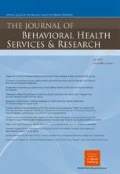Abstract
This article proposes a method of calculating a practical index of improvement for conducting a cost-effectiveness analysis of substance abuse treatment. While the methodology of cost-effectiveness analysis necessitates the use of a single outcome measure, substance abuse treatment can produce multiple, important outcomes that must be considered in policy decisions about funding and alternative treatments. Thus, there is a need to aggregate the variety of outcomes from substance abuse treatment into a single index. The proposed index is a preference-weighted sum of outcomes using data from the Addiction Severity Index. The methodology and use of the index for conducting a cost-effectiveness analysis are illustrated using Addiction Severity Index data from a controlled quasi-experimental field study of case management.
Similar content being viewed by others
References
Alterman AI, O'Brien CP, McLellan AT, et al. Effectiveness and cost of inpatient versus day hospital cocaine rehabilitation.Journal of Nervous and Mental Disease. 1994;182(3):157–163.
Barnett P, Swindle R. Cost-effectiveness of inpatient substance abuse treatment.Health Services Research. 1997;32(5):615–629.
Cartwright W. Cost benefit and cost-effectiveness analysis of drug abuse treatment services.Evaluation Review. 1998;22(5):609–636.
Kraft MK, Rothbard AB, Hadley TR, et al. Are supplementary services provided during methadone maintenance really cost effective?American Journal of Psychiatry. 1997;154(9):1214–1219.
Shephard D, Larson MJ, Hoffman N. Cost-effectiveness of substance abuse services.Addictive Disorders. 1999;22(2):385–399.
McLellan AT, Weisner C. Achieving the public health and safety potential of substance abuse treatment. In: Bikle W, De Grandpre RJ, eds.Drug Policy and Human Nature: Psychological Perspectives on the Prevention, Management and Treatment of Illicit Drug Abuse. New York: Plenum Press; 1996:127–154.
Sindelar JL, Jofre-Bonet M, French M, McLellan AT. Cost effectiveness analysis: Paradoxes of multiple outcomes.Drug and Alcohol Dependence. 2004;73(1):41–50.
Carroll KM. Methodological issues and problems in assessment of substance use.Psychological Assessment. 1995;7:349–358.
McLellan AT, O'Brien CP, Luborsky L, et al. Are the addiction-related problems of substance abusers really related?Journal of Nervous and Mental Disease. 1981;169(4):232–239.
McLellan AT, Luborsky L, O'Brien CP, et al. An improved evaluation instrument for substance abuse patients: the Addiction Severity Index.Journal of Nervous and Mental Disease. 1980;168:26–33, 38.
McLellan AT, Luborsky L, Erdlen F, et al. The Addiction Severity Index: A diagnostic/evaluative instrument for substance abuse clients. In: Gottheil E, McLellan AT, Druley KD, eds.Substance Abuse and Psychiatric Illness. New York: Pergamon Press; 1980.
Drummond MF, O'Brien B, Stoddart GL, et al.Methods for the Economic Evaluation of Health Care Programs. 2nd ed. Oxford University Press; 1997.
Bury D, Shepard D. Developing a utility index for substance abuse: theory and application. Paper presented at: International Health Economics Association Conference; June 6, 1999; England.
Rosenheck R, Cramer J, Xu W, et al. Multiple outcome assessment in a study of the cost-effectiveness of Clozapine in the treatment of refractory schizophrenia.Health Services Research. 1998;33(5, I):1237–1261.
Kleiman R.Preferences for Outpatient Mental Health Treatment [doctoral dissertation]. Baltimore, Md: John Hopkins Press; 1995.
Kenkel D. On valuing morbidity, cost-effectiveness analysis, and being rude.Journal of Health Economics. 1997;16:749–757.
Reuter P. Are calculations of the economic costs of drug abuse either possible or useful?Addiction. 1999;94(5):635–638.
French MT, Mauskopf JE, Teague JL, et al. Estimating the dollar value of health outcomes from drug-abuse interventions.Medical Care. 1996;34:890–910.
French MT, McGeary KA. Estimating the economic cost of substance abuse treatment.Health Economics. 1997;6:539–544.
French MT, Salome HJ, Krupski A, et al. Benefit-cost analysis of residential and outpatient addiction treatment in the state of Washington.Evaluation Review. 2000;24(6):609–634.
French MT, Salome HIJ, Sindelar JL, et al. Benefit cost analysis of addiction treatment: methodological guidelines and empirical application using the DATCAP and ASI.Health Services Research. 2002;37(2):433–455.
Sindelar JL, Manning WG. Cost-benefit and cost-benefit analysis: issues in the evaluation of the treatment of illicit drug abuse. In: Egertson J, Fox D, Leshner A, eds.Treating Drug Abusers Effectively. Oxford: Blackwell; 1997:187–222.
Zarkin G, French M, Anderson D. A conceptual framework for the economic evaluation of substance abuse interventions.Evaluation and Program Planning. 1994;17(4):409–418.
McLellan AT, Hagan TA, Levine M, et al. Does clinical case management improve outpatient addiction treatment.Drug Alcohol Dependence. 1999;55(1/2):91–103.
McLellan AT, Hagan TA, Meyers K, et al. Supplemental social services improve outcomes in public addiction treatment.Addiction. 1998;93(10):1489–1499.
Gold MR, Siegel JE, Russell LB, Weinstein MC, eds.Cost-Effectiveness in Health and Medicine. New York: Oxford University Press; 1996.
Author information
Authors and Affiliations
Corresponding author
Rights and permissions
About this article
Cite this article
Sindelar, J.L., Jofre-Bonet, M. Creating an aggregate outcome index: Cost-effectiveness analysis of substance abuse treatment. The Journal of Behavioral Health Services & Research 31, 229–241 (2004). https://doi.org/10.1007/BF02287287
Issue Date:
DOI: https://doi.org/10.1007/BF02287287




